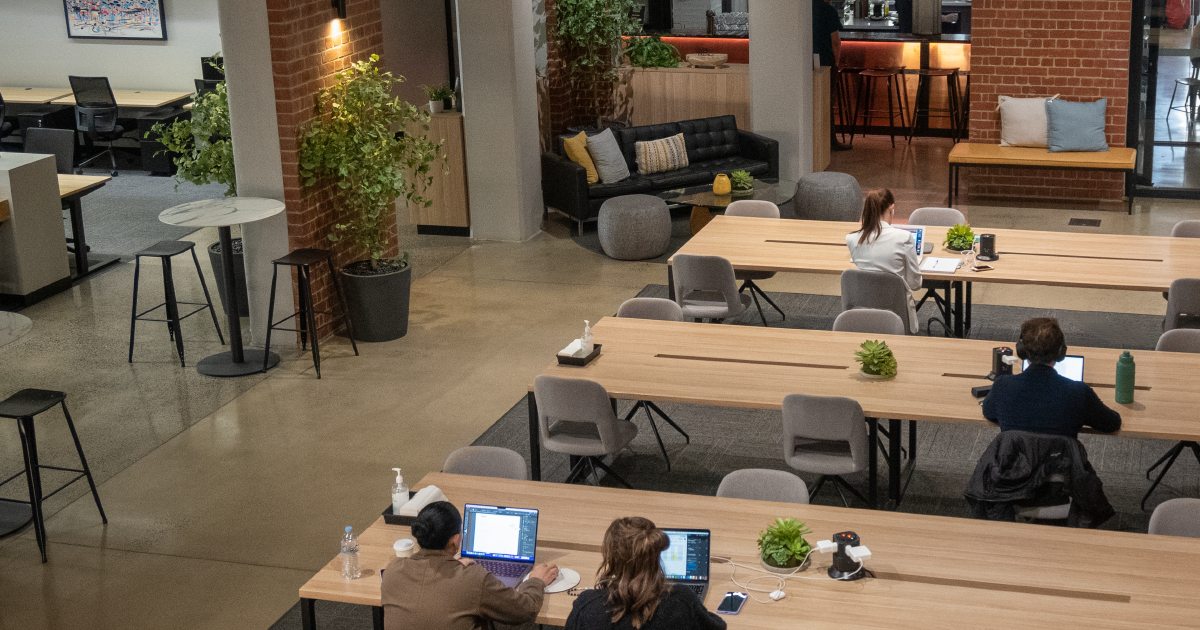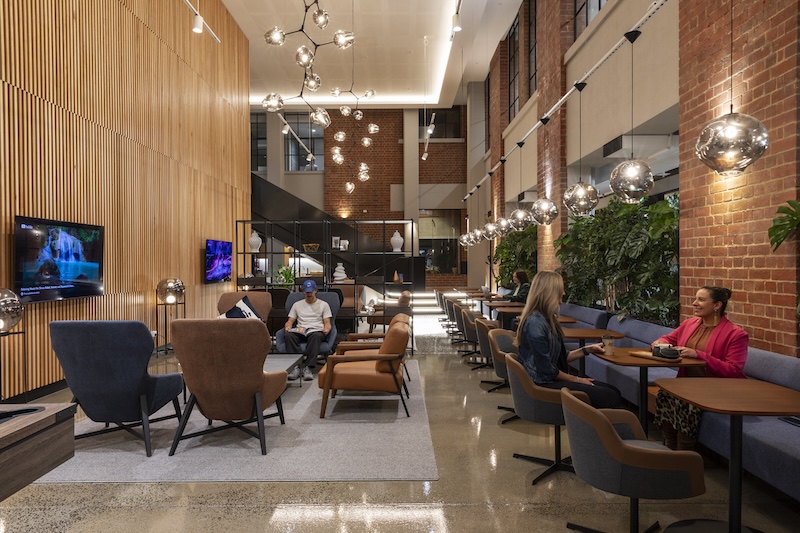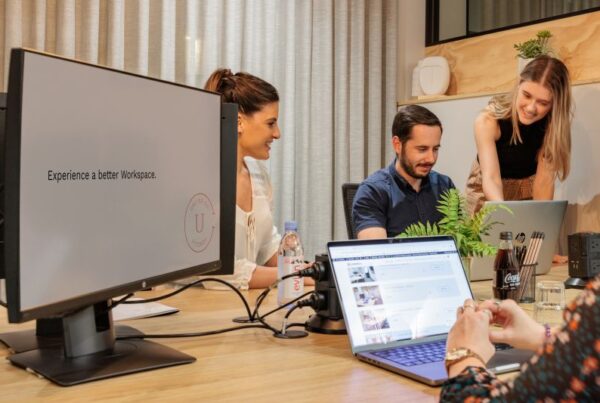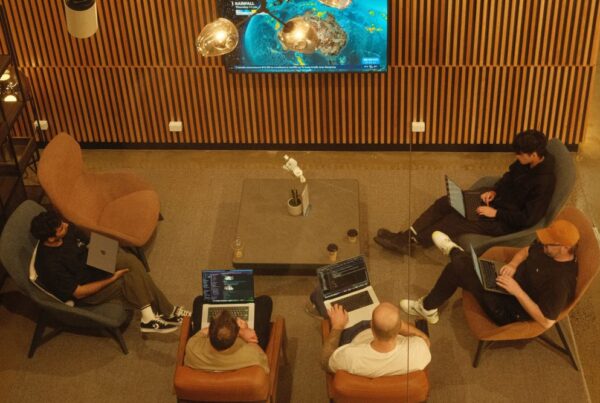
In 2024, the modern workplace has witnessed a significant transformation, driven by emerging trends that have reshaped the way we work. When it comes to workplace trends in 2024, technology thrives in playing a central role. Technology enables greater flexibility and connectivity. The first thing to remember is that remote work has become the new norm, with organizations embracing hybrid models that combine in-person and virtual collaboration. Furthermore, diversity, equity, and inclusion have gained heightened importance, leading to more inclusive work environments. The rise of artificial intelligence and automation has brought both opportunities and challenges, requiring individuals to adapt and upskill. The modern workplace in 2024 is characterized by agility, digitalization, and a focus on employee well-being. In this article, United Co. delves into a few trends that companies should focus on workplace transformation following modern workplace trends in 2024.
Modern Workplace Trends 2024
-
Remote Work
Remote work and hybrid work arrangements have become increasingly prevalent. Companies should invest in technologies and policies that support remote collaboration, communication, and productivity. With advancements in technology and changing employee preferences, remote work arrangements have become more prevalent. Companies are adapting to this shift by investing in tools and policies that enable effective collaboration and communication among remote employees. As a result, this trend not only provides flexibility for employees but also widens the talent pool. Companies can now employ frontline workers from anywhere.
-
Employee Well-being
Prioritizing employee well-being is crucial. Companies should provide fresh support, promote work-life balance, provide mental health support, and foster a positive and inclusive work culture. One of the prominent workplace trends is the increasing focus on employee well-being. Companies are recognizing the importance of mental and physical health in maintaining a productive workforce and a positive company culture. To meet employee expectations and foster a healthy work environment, companies are implementing workplace trends that prioritize work-life balance and provide support for mental health challenges.
-
Diversity, Equity, and Inclusion (DEI)
Companies should actively work towards creating diverse and inclusive workplaces. This includes hiring practices, providing equal opportunities for growth and development, and fostering an inclusive work environment.
-
Flexible Work Arrangements
Offering flexible work arrangements, such as flexible working hours, remote working, or compressed workweeks, can enhance employee satisfaction and productivity. Companies should explore options that meet the needs of their entire workforce.
-
Continuous Learning and Upskilling
With the rapid pace of technological advancements, companies should invest in continuous learning and upskilling programs for employees. This adds strategic value for employers. In addition, this helps keep their skills relevant and enhances employee engagement and retention. With the widening managerial skills gap and the need for evolving skill sets, companies are investing in employee development programs. By focusing on both technical and soft skills, companies ensure that their employees maintain a competitive edge and remain engaged in their roles.
-
Agile and Collaborative Work
Embracing agile methodologies and fostering a collaborative work culture can improve innovation, efficiency, and adaptability. Furthermore, companies should encourage cross-functional collaboration and empower employees to contribute ideas and solutions.
-
Digital Transformation
Embracing digital tools and technologies is essential for staying competitive. Companies should leverage automation, artificial intelligence, and data analytics to streamline processes, improve decision-making, and enhance customer experiences.
-
Sustainability and Corporate Social Responsibility (CSR)
Companies should prioritize sustainability efforts and CSR initiatives. This includes adopting eco-friendly practices, reducing their carbon footprint, and supporting social causes that align with their values.
By all means, workplace trends are not exhaustive, and companies should assess their unique needs and industry-specific trends when determining which areas to focus on. However, these modern workplace trends in 2024 emphasize the importance of employee well-being. Additionally, it emphasizes flexible work arrangements, and continuous learning to create a thriving and productive workforce.
Given these points, as more companies recognize the significance of these trends, they are adapting their strategies hiring processes, and policies to meet the evolving needs of their employees and maintain a competitive edge in the ever labor market.
What are some Workplace Innovation Ideas?
For the future of work in 2024, several workplace innovation ideas can be promoted by business leaders to align with key trends.
Prioritizing mental health
Prioritizing mental health is crucial, and companies can establish programs and resources to support employees’ mental and physical well-being. In like manner, by promoting work-life balance and offering remote work organizations can meet employee expectations and enhance their overall well-being.
Employee engagement
Employee engagement is another important aspect, many employees and companies can foster a positive company culture to boost engagement levels. Furthermore, implementing strategies to enhance communication, collaboration, and recognition can go a long way in keeping employees engaged and motivated. Moreover, embracing remote work arrangements is a growing trend, and providing remote workers with the necessary digital tools and support enables remote employees to maintain productivity and engagement.
In-depth Training
To address the widening managerial skills gap, organizations can focus on developing soft skills through training and development programs. These soft skills, including communication and critical thinking, are essential for success in the modern workplace. Additionally, it is important to support frontline workers who play a critical role in the organization’s operations. By their employees alike providing them with the necessary resources, training, and recognition, companies can ensure their well-being and productivity.
Embrace Digital Tools
Embracing digital tools and technologies is essential for workplace innovation. Organizations can leverage cloud technology, machine learning, and even augmented reality to streamline processes, enhance productivity, mine new data risks and enable collaboration. Additionally, staying up-to-date with the latest workplace trends allows companies to remain competitive and agile in the business world.
Given these points, implementing workplace innovation ideas and workplace trends that address mental health, employee engagement, remote work, skills development, and technological advancements, organizations create modern workplaces that prioritize employee well-being, employee performance, business communication, productivity, and success in 2024.
Read More About How to Reduce Waste in the Workplace: Practical Tips for a Greener Office
Modern Workplace Solutions
In the modern workplace, organizations are seeking innovative solutions to address various challenges and adapt to the changing landscape of human organizations. Here are some key areas where modern workplace solutions are being implemented for the future of work:
-
Comfortable Assessing Candidates Solely
With the advancement of technology, organizations are adopting new methods to assess candidates, including virtual interviews and online assessments. This allows companies to fill critical roles. It also allows companies to evaluate candidates solely based on their skills and qualifications, ensuring a fair and unbiased hiring process. This is likely to compete with traditional sourcing methods.
-
Gig Workers
As the gig economy continues to grow, organizations are incorporating gig workers into their workforce strategies. Leveraging gig workers provides flexibility and access to specialized skills. For this reason, it allows companies to scale their workforce based on demand while maintaining agility and cost-effectiveness.
-
High-Demand Working Periods
Businesses often face high-demand periods where they require additional resources to meet customer needs. Modern workplace solutions involve leveraging flexible staffing arrangements, such as temporary or contract workers, to address these peak periods efficiently and ensure smooth operations.
-
Competitive Talent Landscape
To attract and retain top talent in a competitive job market, companies are implementing innovative business strategies. This may include offering competitive compensation packages, providing opportunities for professional development and growth, and cultivating a positive company culture that appeals to prospective employees.
-
Employee Support
Organizations recognize the importance of supporting their employees’ well-being and productivity. They invest in employee support programs, such as mental health resources, wellness initiatives, and work-life balance policies, to create a supportive and nurturing work environment.
-
Frontline Employees
Frontline employees play a crucial role in customer service and operations. Modern workplace solutions involve equipping frontline workers with the necessary tools, training, and support to excel in their roles. This includes giving clear communication channels, ongoing training opportunities, and recognition for their contributions.
-
Hybrid Work and Flexible Hours
With the rise of remote and hybrid work arrangements, companies are embracing flexible work schedules. All things considered, this enables employees to have greater control over their work-life balance and tailor their hours to accommodate personal needs while meeting business objectives. Additionally, it promotes autonomy and particularly, employee satisfaction.
-
Machine Learning
Organizations are leveraging machine learning algorithms to automate and streamline various aspects of work processes. By and large, this includes automating repetitive tasks, optimizing decision-making processes, and analyzing data to gain valuable insights for strategic decision-making.
Read More About 5 Ways to Save Cost on Office Space
As we navigate through 2024, it’s evident that the modern workplace is evolving rapidly, driven by technological advancements, changing work models, and a stronger focus on employee well-being. Embracing these trends is no longer optional but essential for staying competitive. At United Co., we are committed to providing a future-ready workspace that fosters innovation, inclusivity, and sustainability.
Ready to transform your office with the latest workplace trends? Visit United Co. today to explore our state-of-the-art facilities and discover how we can support your business’s growth in 2024 and beyond.

United Co.
425 Smith St.
Fitzroy VIC 3065
Melbourne, Australia
Wurundjeri Country




